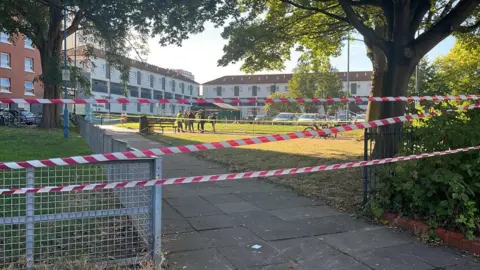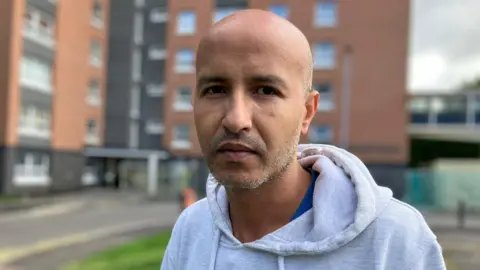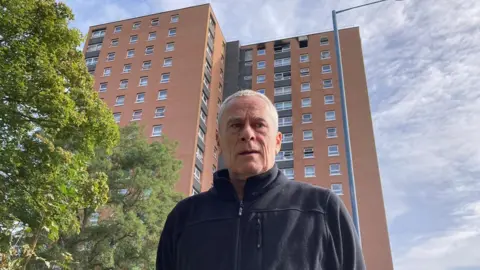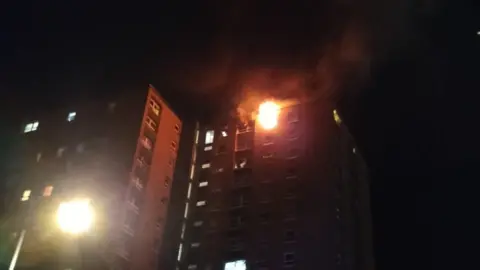Electric bike caused fatal Bristol flat fire, council says
 BBC
BBCAn electric bicycle started a fire in a block of flats that left one man dead and eight other people in hospital, a council has confirmed.
The fire began in a flat in Twinnell House, Wills Drive, Bristol on Sunday.
It is believed the man died falling from the flats as he tried to escape.
Bristol City Council owns the tower block and said the fire was contained in a flat. Residents said they told the council of their fears about homemade electric bicycles being stored there.
Ahmed Sharif, who lives on the third floor of the tower block with four children, said he had been warning the caretaker for months about electrical bikes being kept on the upper floors.

He said the bikes were a "homemade version" and not made by a manufacturer.
"Someone actually designed it poorly and most of them actually have a cheaper version of Lithium ion batteries," which could be more dangerous, he added.
This "has been raised several times, but nobody has done anything about" it, he said.
Mark Barrett lives on the fourth floor of the building and said he went into the bedroom to open a window and let some air in.
"As I open the window I heard what can only be described as ... a muffled scream and a second or two later I see a guy fly past me," he added.

Some residents reported not hearing any fire alarms as the fire took hold at 02:15 BST.
The council confirmed the building had personal fire alarms and the fire had been contained to the upper floor flat where it began.
Avon Fire and Rescue officer Vaughan Jenkins said the systems were all "working as they should".
"Bristol City Council has done everything it can to make those buildings across the county as safe as they possibly can be," he added.
In a statement the council said all fire doors and alarms "responded as expected given the circumstances".
"This meant that emergency services had the time needed to tackle the fire and get people out safely."
It said the external cladding systems also operated "as expected" and "did not ignite or add to the fire".
"This helped to contain the fire inside the flat and reduce the risk to others," it added.
 Supplied
SuppliedSome residents said they were scared to return to the property because the firefighters could not reach the top of the building.
Avon Fire and Rescue confirmed its ladders would only reach the 9th floor.
Fire engine ladders in London reach 20 storeys.
"I'd rather sleep on my friend's floor in a shed than sleep there because I'm just so paranoid about fires," said Nia Gruffudd.
No sprinklers
Simon Shilton, the service's chief fire officer, said the building was "designed to provide a protective means of escape for the residents".
He said the service's turntable ladders had a lifespan of about 17 years.
"When it's time for us to replace our turntable ladders of course we'll take that option to consider what's available on the market at that time."
Fire expert Arnold Tarling said the lack of sprinklers in the building was a concern.
"What really is required is retrofitting of sprinkler systems to all high rise properties," he added.
Ninth floor resident Ali Haji said he grabbed his two daughters in each arm to get them out.
"I walked through smashed glass in the hallways to escape the building," he said.
"I didn't hear any central alarms system at all. The police officers banged every door and broke down doors if they could to get people out."

Qamar, 11, described how her father struggled to get down from their 15th-floor flat as he "couldn't breathe" due to his asthma.
He was "scared and shocked, she said.
"I don't want to come back here because there weren't any alarms or cameras," added Qamar.
Residents of floors one to 13 were allowed to return home earlier.
The council said a few people were treated briefly in hospital, predominantly for smoke inhalation. One person remains in hospital with minor burns.
Three others were treated at the scene.
Allow Twitter content?
Bristol Mayor Marvin Rees said those housed in emergency accommodation would remain there "until we've properly done the work to make sure their flats are properly habitable".
He said when the report was published he wanted to take it to people in the affected block of flats as well as neighbouring flats to ensure open communication and transparency.
"We are very aware that people going back into their flats will be feeling a sense of vulnerability no matter what we tell them, so transparency is really key.
"As an authority we have been incredibly proactive on fire, since Grenfell in particular. We had all of our blocks looked at."

Follow BBC West on Facebook, Twitter and Instagram. Send your story ideas to: [email protected]
